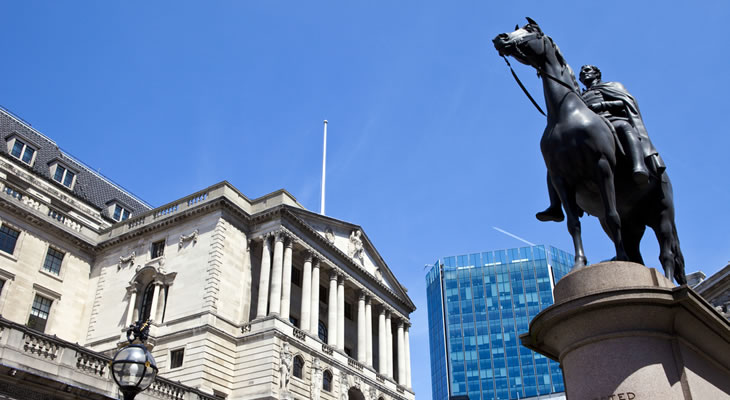This week’s biggest UK economic news was the Bank of England (BoE)’s May policy decision. In its latest ‘Super Thursday’, the BoE left UK monetary policy frozen as expected but the Pound was weakened by the bank’s tone and forecast.
The Pound was down against most major currencies following the bank’s announcements. GBP EUR was down around -0.3%, while GBP USD was also down around -0.3%.
As with March’s monetary policy decision, policymakers were split 7-1 in favour of keeping Britain’s interest rate at its record-low of 0.25%. The dissenter was once again Kristin Forbes, who has argued in the past that rates should rise to counter rising inflation.
Forbes is due to step down when her term ends at the end of June and it seems her hawkish voting habit is unlikely to spread before then. Some analysts suggested the vote split may be 6-2 this time, but no other policymakers became hawkish.
While the decision to leave UK policy at its loosest levels came as no surprise to Pound investors, markets were more disappointed by the bank’s cautious tone.
Despite strong UK PMIs for April, March data published on Thursday morning came in well below expectations. The BoE worsened concerns that Britain’s economy was slowing by cutting its growth forecasts while predicting that inflation would rise higher.
The BoE’s 2017 growth forecast was revised down from 2% to 1.9%, though its 2018 forecast was upgraded from 1.6% to 1.7%. The bank’s inflation forecast for 2017 was upgraded to 2.8%.
Along with its forecast updates, the Bank of England issued numerous warnings about Britain’s economic outlook in the coming year or so.
Among these warnings was a repeat of what many analysts have speculated already. As the Brexit vote’s effect on the Pound continues to cause inflation to rise and wage growth to slow, living standards in Britain are likely to worsen.
The bank also warned that it may need to hike up interest rates sooner than the market thinks.
Meeting minutes indicated that it may need to hike interest rates before late-2019 to counter rising inflation.
However, the Pound was unable to benefit strongly from this news as, according to the bank, this forecast as well as the bank’s growth forecasts were made under the assumption that the Brexit process would be ‘smooth’;
‘In the final year of the forecast, however, the output gap closes and inflation rises slightly further above the target. This is conditioned on the assumptions that the adjustment to the United Kingdom’s new relationship with the European Union is smooth, and that Bank Rate follows the market-implied path for interest rates.’
Some analysts have taken this as an urge towards UK Prime Minister Theresa May, to get a UK-EU deal rather than Brexiting without any deal at all.
BoE Governor Mark Carney held a press conference following the BoE announcements, in which he defended record-low policies and argued that higher inflation was a price worth paying if it allowed for more job creation as low interest rates do.
The indication of a UK interest rate hike being possible if inflation continues to rise gave the Pound some support and limited its losses. Overall though, investors hoping for hints of sooner tightening or another policymaker being more hawkish, as well as the bank’s gloomy UK forecasts, left Pound exchange rates dropping.


Comments are closed.